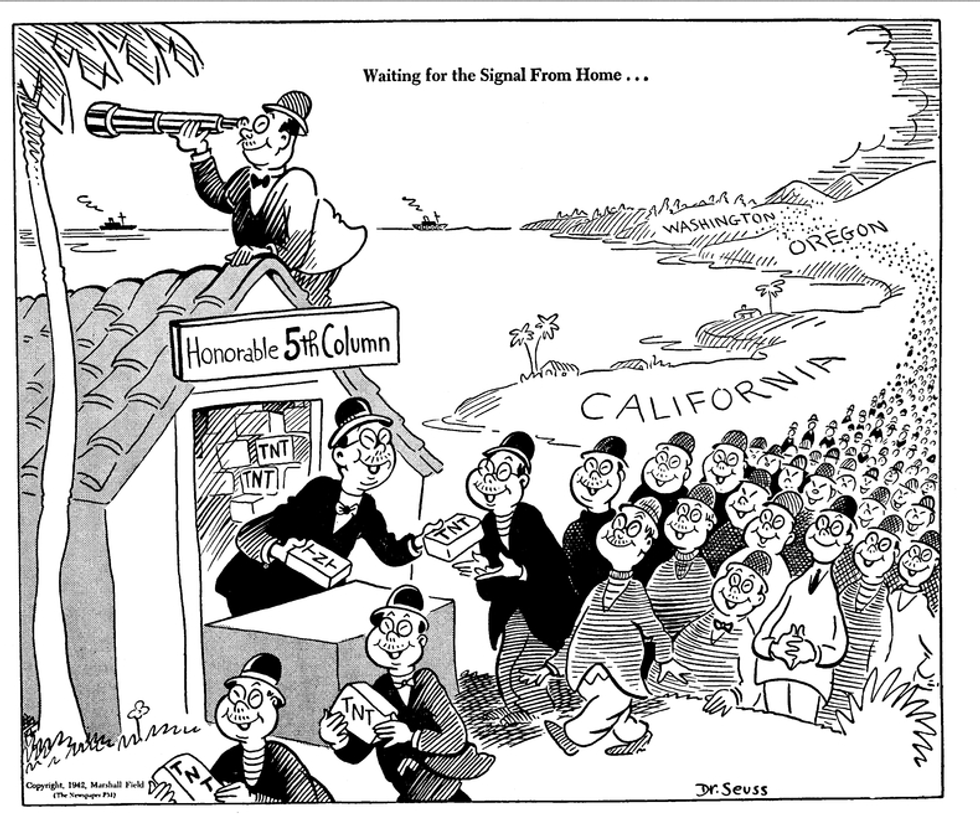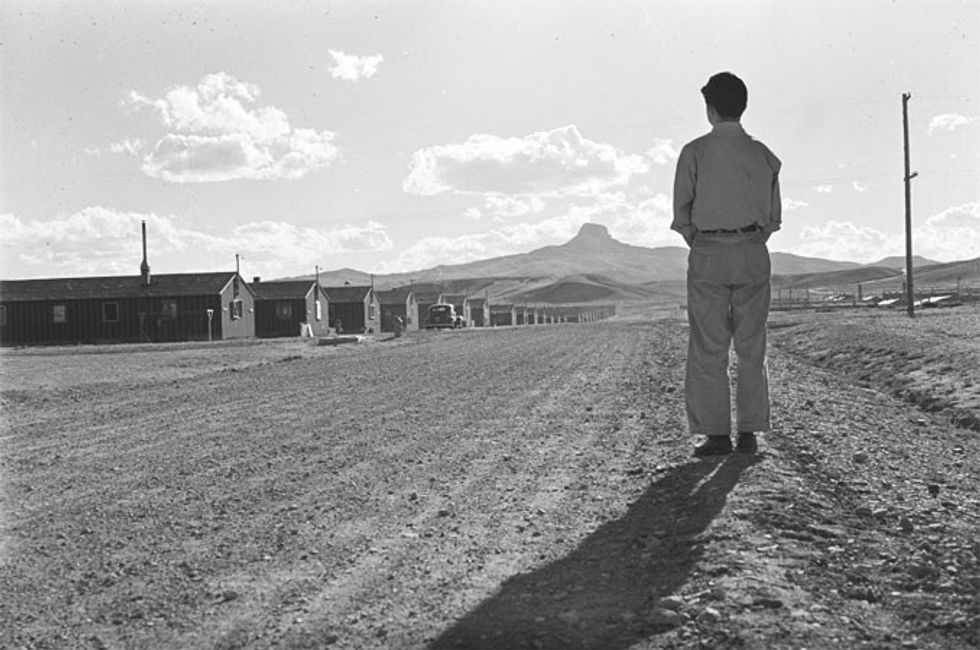During World War 2, the Nazi party rose to power in Germany with it's leader, Adolf Hitler, in power. Hitler had a belief that the German race was superior to all others in the world. He envisioned an Aryan race, with their main characteristics being, blonde hair with blue eyes, and white skin. Hitler discriminated against all people who did not fit these characteristics. Hitler did anything that he could to try to make his vision become a reality. During World War 2, in America, we viewed Adolf Hitler and the Nazi party as our enemies.
We despised his views and everything he stood for. But are we much different than the Nazi's? Just how similar is Nazi racism and American racism? What ideals did each side take from one another?
Similarities
One similarity would be, the use of camps to contain their "enemy". For example, the Nazi party would send primarily Jews, but also Slavs, Poles, Gypsies, Russians, Homosexuals, and the disabled into concentration camps. Hitler set up concentration camps to incarcerate those who he viewed as political enemies.
In America during World War 2, the Americans placed over 120,000 Japanese people into internment camps. These camps were in place to keep the Japanese under surveillance. Another reason for the internment camps was to make sure the Japanese civilians were not spies. These camps were designed to be similar to a prison. Police and guards were on duty at all times, barbed wire fences encased these camps, and there was no relationship with anybody outside the camp itself.
A second similarity would be, the propaganda that was present. For example, Nazi propaganda about Jews were portrayed in a very demeaning and discriminatory way.
Some of the prominent features that these posters showed were, long beards, long noses, and always holding or pinching money.
The poster above translates to, "The Eternal Jew" which eludes to the never-ending corruption of the Jews. Hitler justified his actions of genocide by believing that the Jews were the reason behind the terrible economic status of Germany, at the time. Hitler believed that the Jewish people were corrupt and were the main cause for the economic recession. This poster advocates for the stereotype.
American propaganda against the Japanese was very similar to the Nazi propaganda. Some of the features that are prominent in these posters were, squinty eyes, buck teeth, and circle glasses.

The last similarity would be, discrimination of immigration. In 1924, the U.S. passed a law restricting immigration on Eastern and Southern Europeans. Consequently, many Jews in Poland and other countries could not enter the U.S. without waiting for their Visas. In the documentary, America and the Holocaust, it highlights one particular family that could not get their visas. As mentioned in the film, even with the best papers, it could take years to get their visas. Not to mention, the waiting list was incredibly long. In the documentary, the family was, at one point, number 22,344 place in line for their visa. I can not begin to imagine the number of innocent lives that could have been saved if the Immigration Quota of 1924 had not been in place. In Germany, one of Hitler's main policies was to stop all immigration into Germany. Hitler wanted to keep other races and ethnicites out of Germany. He even went as far as to say, that all immigrants that came before 1914 should be compelled to leave Germany.
Differences
As mentioned earlier, both in Germany and America there were camps designed to contain political enemies. However, the conditions in Nazi concentrations camps was far worse than in America. In concentration camps, the prisoners were not treated humanly. Prisoners did not receive adequate clothing, food, health services, or housing. In interment camps, the Japanese, still not being treated very humanly, were not forced into labor. Their housing was not by any means adequate, but the living conditions were better than living in a concentration camp.
A second difference would be, their visions of white supremacy. All throughout history, American white supremacy was not as specific as in Germany during World War 2. In America, the only thing that mattered was the color of your skin. In Germany during World War 2, Hitler wanted the Aryan race to be, blonde hair with blue eyes, and white skin. Hitler's vision was much more specific than white supremacy in America.
Lastly, a major difference between Nazi racism and American racism would be, that American racism never put in place a system of killing groups of people based on their characteristics. Even though there were lynchings that have taken place, there has never been a federal government ordering the death of a certain group of people. As a result of the systematic killing that Hitler designed, an estimated 15-20 million people died in total.
Ideals that Hitler took from American Racism
In 1924, the U.S. passes a Immigration quote to deal with an increased want of immigration to the U.S. by primarily Southern and Eastern Europeans. In this law there was an outright ban on immigrants that were Arab and Asian. Hitler saw this and actually agreed with it.
Hitler's believed that there should be no immigration to Germany.
Hitler also agreed with compulsory sterilization. This was passed by the legislation in the U.S. It allowed for forced sterilization on certain individuals. In the U.S. this was used on people with disabilities, such as the blind, deaf, and mentally disabled. Hitler agreed with this, but he also took it one step further. Hitler wanted to make reproduction among these people impossible. Hitler saw them as "defective" and "unfit" for the perfect society that he was trying to create. Hitler would go on to kill these individuals in concentration camps rather than using forced sterilization.
Ideals that American Racist's took from the Nazi Party
The Klu Klux Klan has been apart of American racism since its creation in 1865. Their history has no ties to the Nazi party, however, Neo-Nazism is very common in the clan's beliefs since the start of the third clan in 1946. Many klansmen follow and believe in the ideologies of Hitler and the Nazi party. The ideology of the Klu Klux Klan, however, does not fully support the Aryan race ideology that Hitler had. The Klan was revitalized by the Nazi ideology and white supremacy.
Conclusion
There are definitely parallels between the two sides. However, the Nazi party went farther with their actions than American racists.
By, creating a regime of the largest systematic killing of people in the world and being responsible for the largest genocide in history. American racism does not compare in that aspect. Even though there are differences, we can still see parallels in Nazi racism and American racism.



























